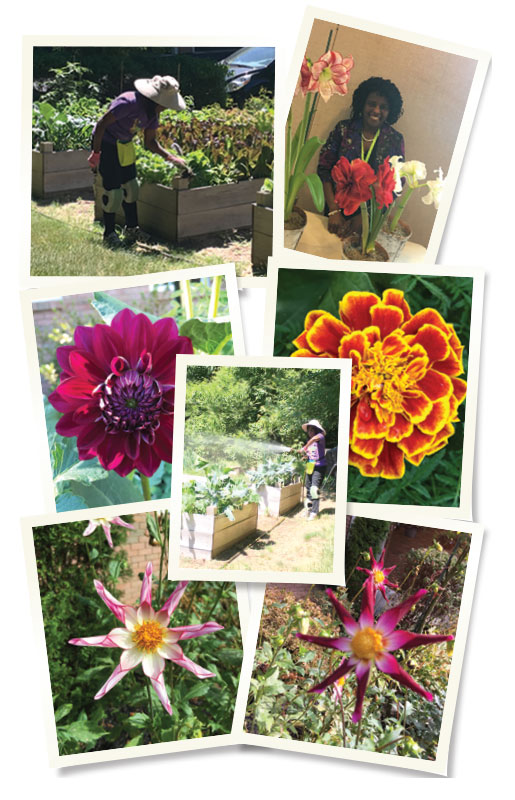Deborah Dyett Desir, MD, vividly remembers her first day as an undergraduate student at Harvard University, Boston. When her parents helped her move into the dorm, her mother, Betty, handed her a beautiful begonia.
“My response was, ‘What on earth am I going to do with this plant?’” she says, recalling how she examined the plant from all angles. “I started off with this one plant and ended up with seven in my dorm room. My roommate didn’t mind my plants, and I didn’t mind her cat.”
Throughout college, Dr. Desir’s love for plants blossomed. So did her education. After graduating from Harvard in 1976, she moved on to medical school at Yale University, graduating in 1980, and then completed her internship, residency, and fellowship at Yale between 1982 and 1987. During her fellowship, her mentor was Stephen Malawista, MD, a former ACR president. She is the founder of the Arthritis & Osteoporosis Center PC, which supports three locations in Connecticut (Hamden, Branford and Milford).
Looking back, she believes her mother planted a seed that day, passing along a genetic family trait of caring for all things green. As an award-winning gardener of both indoor and outdoor plants, Dr. Desir doesn’t mind getting her hands dirty and says there’s virtually nothing she wouldn’t do to help any patient or plant grow strong and healthy.
Sharing & Caring

Top Left: Dr. Desir harvests the fruits of her labor.
Top Right: Dr. Desir, among her flowers.
Middle: Dr. Desir waters her vegetable garden.
Dr. Desir doesn’t exactly know how many plants live in her house. Maybe 150, she says. Her favorites include jade, philodendrons and African violets. She even carved out an intensive care unit in a sitting room, where she temporarily places sick plants for additional care.
“I have an actual section in my house that I call the plant hospital,” she says, adding that the recovery rate of her plants rivals that of the Mayo Clinic. “If a plant is ill, has fungus, for example, I don’t throw it out. I bring it to this room and nurse it back to health by putting it under a grow light and keeping an eye on it.”
She also grows fruits and vegetables in her backyard in raised beds built by her husband, Gary V. Desir, MD, chair, Department of Medicine, at Yale Medical School. Lettuce, tomatoes, squash, cucumbers, melons and peppers are just some of her crops.
Her green thumb reaches beyond her personal property. For roughly the past decade, Dr. Desir has been a member of the Garden Club of New Haven, which gets involved in numerous local projects. Its 90 active members create floral arrangements for patients in area nursing homes and hospitals; schedule monthly educational lectures for the community on horticulture, everything from beekeeping to butterflies; and protect elm trees that may be under siege in the green or town square from blight or endangered by utility companies that chop them down before they tangle with power lines.
As the club’s new treasurer, she says members also purchase and plant trees in the green with help from community donations. Since the club meets every month at the Connecticut Agricultural Experiment Station, the state’s agricultural experiment station that engages in scientific research, she says club members often interact with station staff, who sometimes diagnose their plants’ illnesses and develop treatment plans.
Other times, club members are a great source of knowledge. Dr. Desir recalls how she once emailed a photo of one of her favorite plants to members because she couldn’t figure out how to propagate it or grow a new one from the existing plant. She received multiple responses that proved effective. Another time, when Dr. Desir was hosting a club meeting at her home, she recalls how one member admired one of her plants, which was a present from her mother.
“She told me it was a very rare Christmas cactus,” she says. “I learn something every day from the members.”
Daily Delight
Dr. Desir may be as proud of her plants as she is of her four children. In November 2014, the Garden Club of New Haven awarded her the prestigious Carol English Stancliff award for horticulture excellence. Then in January—the club hosts award shows for different flowers every month—she captured first, second and third prize ribbons for her three amaryllis plants.
She believes her years of gardening have taught her patience, which is especially needed when dealing with sick patients or plants. “Nothing is instantaneous in gardening or medicine,” she says.
Still, gardening is gratifying. On many mornings, she says, one of the first things she sees is a bright, beautiful plant with a new stunning flower. Perhaps there’s no better way to start off the day.
Dr. Desir can grow almost any plant, except for cyclamen, which remains a mystery. She believes the secret to gardening—indoors or outdoors—is to grow plants you enjoy. Make sure indoor plants receive plenty of sunlight, and if you live in a cold climate, start early, particularly for vegetables. Plant seeds indoors, otherwise you won’t be able to harvest veggies before the first frost.
“It’s also fun to grow some plants that have medicinal value, like foxglove, which is where digitalis comes from and is used to create digoxin, which is used to treat congestive heart failure,” she says. “I grow these types of plants as a nod to ancient chemists or alchemists.”
Looking ahead, Dr. Desir says living with her growing green family makes her happy, even though no one ever pays rent or does the dishes.
“I like waking up in the morning and seeing a new flower blooming or plant that has grown,” she says. “They’re a welcome surprise every morning.”
Carol Patton is a freelance writer based in Las Vegas.
Editor’s note: Listen to Dr. Desir talk about her secrets to successful gardening.



